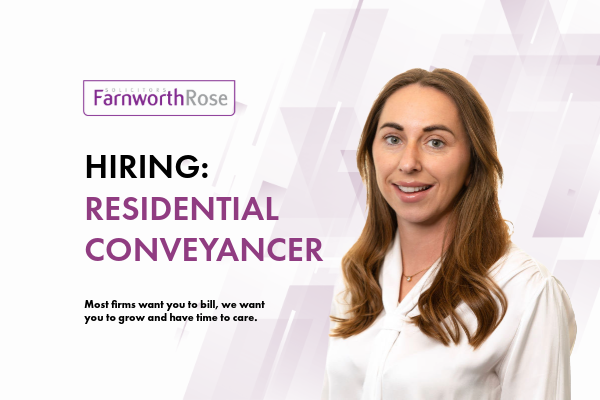
Solicitors for the Elderly. Specialists in Lifetime Planning & Long Term Care
✓ Specialist Solicitors in elderly care solutions.
✓ Quality long-term care advice at affordable rates.
✓ We are a full-service law firm, able to seamlessly harness broader legal expertise where a matter demands other specialist skills.
Elderly Care Solicitors
At Farnworth Rose, our Elderly Care Solicitors are here to guide you through the legal side of later life care with clarity, compassion and trusted advice. We provide practical, personalised support at every stage, from early planning to urgent funding concerns, always focused on protecting your interests and helping you move forward with confidence.
Later life care often raises difficult questions. It can affect your finances, your home, your future wishes and the wellbeing of the people you care about most. When you're faced with decisions about funding, assessments or long-term care options, you need advice from solicitors who understand the system and know how to protect what matters.
Our Elderly Care Solicitors regularly supports elderly and vulnerable clients with NHS Continuing Healthcare, care home funding, retrospective claims and planning for future care needs. Every situation is unique, which is why we take time to understand your concerns and explain your legal position clearly and simply.
Whatever your situation, having the right support is essential to understanding your options and being treated fairly. The best support requires a team of multi-disciplinary specialists who can provide compassionate, tailored advice to ensure you get the help and answers you need. We specialise in care advice services, such as:
With over 35 years of experience, we’re trusted across Lancashire and beyond for our honest advice, responsive service and consistently strong results. You’ll always have direct access to a solicitor who specialises in elderly care law and will guide you from your first conversation through to the outcome you need.
To speak with one of our Elderly Care Solicitors, call us today on 01282 695 400 or complete the enquiry form below.
Why Choose Farnworth Rose Solicitors For Elderly Care Legal Advice?
When it comes to elderly care, the right legal advice can make all the difference. At Farnworth Rose, our Elderly Care Solicitors provide more than technical knowledge. We offer calm, clear and compassionate support through some of life’s most difficult decisions.
We’ve helped families across Lancashire and beyond protect their loved ones, challenge unfair care decisions, and plan with confidence for the future. Whether you’re seeking guidance on care home fees, NHS Continuing Healthcare, or how to avoid unnecessary financial exposure, we’re here to guide you every step of the way.
You’ll work directly with an experienced solicitor who understands the legal framework around later life care — including the Care Act 2014, local authority funding rules, and continuing healthcare assessments. We’ll explain your position clearly, explore every available option, and act quickly to protect your interests.
At Farnworth Rose, we pride ourselves on delivering advice you can trust — with a service that’s always personal, responsive and professional.
When you instruct us, you can expect:
A dedicated Elderly Care Solicitor who will manage your case from start to finish
Honest advice, free from jargon, tailored to your specific situation
A thoughtful, strategic approach that reflects your goals and concerns
Transparent pricing with no hidden fees
A supportive service designed to ease stress, not add to it
We know how important these decisions are. That’s why we make it our priority to give you confidence, clarity and real peace of mind.
Our Care Home Funding Services
Later life care can raise a number of legal, financial and practical questions. At Farnworth Rose, we offer a complete range of services to support you at every stage, whether you are planning ahead, managing ongoing care, or dealing with the costs of care already provided.
Each of the services below is handled by a specialist solicitor with a deep understanding of care funding law and the wider system. We will work closely with you to ensure your rights are protected and that you only pay what is fair and lawful.
+ Care Fee Planning
Planning for future care is one of the most important steps you can take to protect your home, savings and peace of mind. Our Residential Care Planning Solicitors help you put the right legal structures in place to make sure your wishes are respected and your assets are protected.
We can assist with setting up or reviewing Wills and Trusts, preparing Lasting Powers of Attorney and offering clear advice on how care fees might affect your estate. With our support, you will be able to make informed decisions that safeguard your financial future and reduce the risk of unnecessary care costs.
+ NHS Continuing Care
If you or a loved one has significant health needs, you may be eligible for full care funding through the NHS. Our Continuing Healthcare Solicitors can advise you on whether you qualify and help you navigate the assessment process with confidence.
We will explain your rights clearly, support you through the multi-disciplinary team (MDT) assessment and, where needed, challenge decisions that do not reflect your medical circumstances. Whether the care is at home or in a nursing facility, we are here to ensure the NHS meets its obligations so that you are not wrongly asked to pay.
+ Funding Queries for Those Already in Care
Even after care has begun, it is important to regularly review your funding arrangements. Circumstances change, and you may find that you or your family member are paying more than is legally required. Our Care Funding Advice Solicitors can step in to review your situation and provide guidance on whether a reassessment is needed.
We regularly help clients identify overpayments, secure new assessments or challenge top-up fees that are being unfairly applied. If something feels off, we will take a closer look and help you put things right.
+ Retrospective Claims
If someone you love has passed away and you believe they were wrongly charged for care, you may be able to recover some or all of the fees. Our Care Home Fee Recovery Solicitors can advise you on whether a retrospective claim is possible and help you pursue it.
We will carry out a detailed review of your case, including medical records and previous assessments, to understand if funding should have been provided. If the evidence supports a claim, we will handle the process on your behalf, ensuring you get the answers and the compensation you deserve.
What is the Law Around Care and Funding in Later Life?
The legal framework for care in later life can feel overwhelming, especially when you are trying to make urgent decisions for yourself or a loved one. At Farnworth Rose, we help you cut through the confusion by explaining the law in plain, practical terms so you can focus on what matters most.
In England and Wales, the Care Act 2014 sets out how local authorities must assess care needs and determine who is responsible for funding. Your financial circumstances, care needs and health conditions all play a part in how support is offered. In some cases, care must be funded by the local authority. In others, the NHS may be responsible under the rules for NHS Continuing Healthcare.
Unfortunately, many people are wrongly assessed or left unaware of their full entitlements. Mistakes can lead to families paying thousands in unnecessary care home fees or losing assets they could have protected. That is why getting the right legal advice early on is so important.
We also advise on key legal tools that can help you plan ahead, such as:
Lasting Powers of Attorney so someone you trust can make decisions if you lose capacity
Statutory Wills when a Will needs to be made for someone who can no longer decide for themselves
Estate planning to protect assets and make sure your wishes are followed
Mental Capacity Act advice to ensure decisions are made fairly and within the law
Our solicitors specialise in the law around later life care. We will explain how the rules apply to you, what rights you or your loved one have, and what options are available to make sure those rights are upheld.
How our Elderly Care Solicitors Can Help
From your first conversation with us, you will speak directly with a Elderly Care Lawyer who specialises in Elderly Care Law. We will take the time to understand your situation, explain your options in plain English and help you make decisions with clarity and confidence.
We know that issues around care and funding often arise at difficult moments. You may be dealing with a sudden change in circumstances, pressure from care providers, or uncertainty about how decisions are being made. Our role is to take that pressure off you by giving you the right advice at the right time, and standing by you every step of the way.
Our team regularly advises clients on care needs assessments and financial means testing, helping you understand how your local authority should be applying the rules. We also support families through NHS Continuing Healthcare applications and appeals, working to secure full funding where health needs meet the legal criteria. If you are being asked to pay top-up fees, sign a care or nursing home contract you are unsure about, or contribute more than you believe is fair, we can step in to review the situation and protect your position.
For those planning ahead, we provide clear and practical advice on how to protect the family home, preserve savings, and make sure your long-term wishes are respected. And for families who believe a loved one was wrongly charged for care in the past, we can review the history and pursue a claim for recovery where appropriate.
Whatever your concern, our advice is always honest, realistic and focused on what matters most to you. We are here to help you feel in control, protect your legal rights, and move forward with peace of mind.
Frequently Asked Questions for Care Advice
+ What If I Need To Move Into A Care Home?
If staying at home is no longer the right option, moving into a care home can be a significant step, both emotionally and financially. Care home placements are usually means-tested, which means your income, savings and property may be assessed to determine who is responsible for paying the fees.
Having a Lasting Power of Attorney (LPA) in place can make the transition smoother, as it allows someone you trust to manage the financial and practical decisions on your behalf. This is especially important if you later lose the ability to make those decisions yourself.
Our Elderly Care Solicitors will guide you through your funding options, help you plan for care home costs, and make sure your legal position is protected at every stage.
+ What Happens If I Can’t Make Decisions In The Future?
Losing the ability to make decisions can happen gradually, through conditions like dementia, or suddenly, as a result of illness or injury. If that happens, a Lasting Power of Attorney ensures that someone you trust has the legal authority to act on your behalf.
You can appoint attorneys to deal with your finances, your property, and your health or welfare. Done properly, an LPA allows you to stay in control, even when you are no longer able to make decisions for yourself.
Our experienced Elderly Care Lawyers will help you prepare an LPA that reflects your wishes and provides peace of mind for both you and your family.
+ What If I Don’t Have A Close Family To Act As An Attorney?
You don’t need to have children or immediate family to put a Lasting Power of Attorney in place. Many people choose a trusted friend, or appoint a professional such as a solicitor, to act on their behalf if they lose capacity in the future.
Choosing a professional attorney gives you the reassurance that your affairs will be managed with care, experience and legal accountability. It’s a practical option that ensures your best interests are protected, even if you don’t have family around you.
Our Elderly Legal Services team can help you explore your options and put a plan in place that works for your personal situation.
+ Can A Lasting Power Of Attorney Help Protect My Assets?
A Lasting Power of Attorney is not just a safety net, it can also be an important part of protecting your financial future. By appointing someone you trust to manage your finances, you can ensure that your home, savings and other assets are looked after in the way you would want.
You can also include preferences or guidance within the LPA, such as how care should be funded, or what should happen to your home if you move into residential care. With the right legal advice, you can build in protection while retaining choice and control.
Our Elderly Care Solicitors will work closely with you to ensure your LPA is set up properly and reflects your long-term priorities.
+ What If My Loved One Loses Capacity Without An LPA In Place?
If someone loses mental capacity without having made a Lasting Power of Attorney, you won’t be able to make decisions for them unless you apply to the Court of Protection. This is known as a deputyship application and can be complex, costly and time-consuming.
Deputyship can take several months to be approved, during which time decisions about care, property or finances may be delayed. The court of protection applications will also decide who should be appointed, which might not reflect your loved one’s wishes.
Our Elderly Care Lawyers can advise you on whether deputyship is required and guide you through the application with care and clarity. Wherever possible, we also help clients avoid this situation entirely by planning ahead.
+ How Do I Make Sure My Attorney Understands What I Want?
When you create a Lasting Power of Attorney, you can include preferences and instructions to guide the person acting on your behalf. These might cover how your money should be managed, what kind of care you would prefer, or how your property should be handled if you move into a care home.
You can also have open conversations with your chosen attorneys while you still have capacity, to make sure they understand what matters most to you. A solicitor can help you put your wishes into clear legal terms and anticipate situations that might arise later.
Our Lawyers for the Elderly will help you create an LPA that reflects your values and gives your attorneys the guidance they need to make the right decisions on your behalf.
+ Can I Still Make An LPA If I Have A Health Condition?
Yes, you can still make a Lasting Power of Attorney if you have a health condition, as long as you have mental capacity at the time of signing. Many people choose to set up an LPA shortly after receiving a diagnosis so they can put trusted support in place while they are still able to make decisions independently.
Conditions such as dementia or stroke can affect capacity over time, which is why early planning is so important. The process is still fully accessible, and your solicitor will ensure that everything is done properly and that your capacity is recorded if necessary.
An Elderly Care Lawyer at Farnworth Rose can guide you through the process with care, sensitivity and clear advice.
+ What Does An Attorney Legally Have To Do?
If you’re appointed as an attorney under a Lasting Power of Attorney, you are legally required to act in the donor’s best interests. This means making decisions with care, keeping financial records, avoiding any conflicts of interest, and following any preferences they’ve set out in the LPA.
You also have a duty to involve the person in decisions as much as possible, and to respect their rights, privacy and dignity.
Our Lawyers for the Elderly can guide you through your responsibilities and help you act with confidence, whether you’re making financial choices, arranging care, or handling important paperwork.
+ Can A Professional Be Appointed As A Deputy?
Yes. If the Court of Protection decides that a family member is not suitable or willing to act as deputy, it may appoint a professional such as a solicitor. A professional deputy is authorised to manage someone’s property and financial affairs when no LPA exists and capacity has already been lost.
This can provide peace of mind where no family members are available, or where the situation is complex and needs expert oversight. The deputy must report to the Court annually and is only allowed to make decisions that are in the person’s best interests.
Our Elderly Legal Services team can step in as professional deputies where needed or help you apply to take on the role yourself.
+ What Happens To The LPA When Someone Dies?
A Lasting Power of Attorney automatically ends when the person who made it dies. From that point on, the executors of the estate take over responsibility for dealing with finances, property and any other arrangements.
If you’ve been acting as an attorney, you’ll need to stop all activity under the LPA and pass any relevant records to the executors or solicitors handling the estate. In some cases, the same person may be both an attorney and an executor, but the legal authority comes from different sources.
At Farnworth Rose, our Elderly Legal Services team can guide you through this transition and make sure everything is handled properly and respectfully.
+ Is It Too Late To Put An LPA In Place If I’ve Already Been Diagnosed With Dementia?
Not necessarily. A diagnosis of dementia doesn’t automatically mean you lack capacity to make legal decisions. If you can still understand what an LPA is and what it allows someone to do on your behalf, you may still be able to put one in place.
In situations like this, it's crucial to seek legal advice straight away. A solicitor can assess whether you meet the requirements and ensure that the LPA is created properly, with medical input if needed.
Our Elderly Care Solicitors are experienced in supporting clients with early-stage dementia and will always approach the process with sensitivity, patience and professionalism.
+ What If I’ve Been Asked To Act As An Attorney But I’m Not Sure I’m Ready?
Being asked to act as someone’s attorney is a sign of trust — but it also comes with legal responsibilities. You’ll need to make decisions in the donor’s best interests, follow any preferences they’ve set out, and keep clear records of financial decisions or care arrangements.
It’s perfectly normal to feel unsure, especially if you’re unfamiliar with the legal process or if family dynamics are complex. You don’t have to accept the role, and you can also choose to share the responsibility with others.
Our Lawyers for the Elderly can help you understand exactly what’s involved so you can decide whether this is the right role for you and support you if you choose to go ahead.
+ What Is The Difference Between An Attorney And A Deputy?
An attorney is someone chosen by a person while they still have mental capacity, through a Lasting Power of Attorney. A deputy, on the other hand, is appointed by the Court of Protection when someone has already lost capacity and hasn’t made an LPA.
Being a deputy often involves more court supervision and reporting requirements than acting as an attorney. It can also take longer to set up and is generally more expensive.
Our Elderly Care Lawyer team can explain both options in detail and help you put the right arrangement in place depending on your family’s circumstances.
+ What If My Loved One Needs Care But Doesn’t Have Mental Capacity?
If a family member or loved one no longer has the mental capacity to make their own decisions and they haven’t set up a Lasting Power of Attorney, you’ll need to apply to the Court of Protection for a deputyship order.
This legal process allows someone to be appointed as a deputy to manage their finances, care or welfare decisions. It can take several months and often involves ongoing responsibilities, including reporting to the court and managing their affairs with strict oversight.
Our Elderly Care Solicitors can help you understand what’s involved in becoming a deputy, assist with the application and provide long-term guidance as you take on this important role.
Meet the Team
Contact our Elderly Care Solicitors
Planning or managing Elderly Care can be one of the most emotional and complex challenges you or your family may face. Whether you're arranging care for yourself, supporting a loved one through the transition into a care home, managing the cost of ongoing care, or seeking to recover care fees that were wrongly paid, Farnworth Rose is here to guide you with empathy and expertise.
We understand that every situation is different—and that behind every legal matter lies a person, a family, and often a sense of urgency. With over 35 years of experience helping individuals and families across England and Wales, we provide trusted legal support at every stage of the care journey. From care cost planning and NHS Continuing Healthcare funding to retrospective claims and care home contract advice, our specialist solicitors work with compassion, discretion and a deep understanding of the care system.
As the leading firm of Elderly Care Solicitors in Lancashire, and one of few specialist teams in the whole of England, we are recognised for providing clear, practical advice combined with a personal approach that puts your needs first.
As a full-service firm of Solicitors in Burnley & Nelson, we are able to seamlessly integrate additional legal service expertise where necessary, depending on your specific needs.
Our specific expertise and record of success makes us the obvious choice as the leading firm for Elderly Care Solicitors in Preston, Blackburn, Manchester, Rochdale and Bolton, and we continue to support clients across Yorkshire, in Bradford, Huddersfield, Skipton, Keighley, and beyond.
Whether you are planning ahead, responding to an urgent care situation, or seeking answers about care funding decisions, you can rely on Farnworth Rose to stand by your side and help you protect what matters most.
To speak with one of our specialist Elderly Care Solicitors, call us today on 01282 695 400 or complete the form below, and we’ll be in touch to assist you with your care funding needs.





